|
|
|
Sort Order |
|
|
|
Items / Page
|
|
|
|
|
|
|
| Srl | Item |
| 1 |
ID:
077072
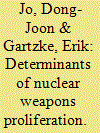

|
|
|
|
|
| Publication |
2007.
|
| Summary/Abstract |
Nuclear weapons proliferation is a topic of intense interest and concern among both academics and policy makers. Diverse opinions exist about the determinants of proliferation and the policy options to alter proliferation incentives. We evaluate a variety of explanations in two stages of nuclear proliferation, the presence of nuclear weapons production programs and the actual possession of nuclear weapons. We examine proliferation quantitatively, using data collected by the authors on national latent nuclear weapons production capability and several other variables, while controlling for the conditionality of nuclear weapons possession based on the presence of a nuclear weapons program. We find that security concerns and technological capabilities are important determinants of whether states form nuclear weapons programs, while security concerns, economic capabilities, and domestic politics help to explain the possession of nuclear weapons. Signatories to the Treaty on the Non-Proliferation of Nuclear Weapons (NPT) are less likely to initiate nuclear weapons programs, but the NPT has not deterred proliferation at the system level.
|
|
|
|
|
|
|
|
|
|
|
|
|
|
|
|
| 2 |
ID:
157107
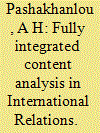

|
|
|
|
|
| Summary/Abstract |
Content analysis has once again come to the forefront of discussions regarding methods in International Relations (IR). The first wave of content analysis in IR lasted from the 1940s to the 1960s and was marked by a commitment to quantitative and manual analyses. The second wave of content analysis appeared at the start of the third millennium and continues to pervade the discipline. As with the first wave, it proceeds in a predominantly quantitative manner but emphasizes computer-assisted analysis rather than manual analysis. Critics and advocates of the method alike have, highlighted numerous shortcomings with these approaches. In order to address these limitations, the present investigation argues for a fully integrated content analysis that has the potential to ameliorate the identified weaknesses that have hitherto plagued the method. It accomplishes this task by combining all facets of the method: quantitative, qualitative, manual, and computer-assisted content analyses within a single research project.
|
|
|
|
|
|
|
|
|
|
|
|
|
|
|
|
| 3 |
ID:
066285
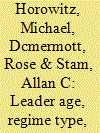

|
|
|
| 4 |
ID:
128948
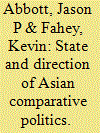

|
|
|
|
|
| Publication |
2014.
|
| Summary/Abstract |
In this article we explore the state of the discipline of comparative Asian politics. In particular we analyze five aspects of research on Asia: whether the empirical scope of research is largely noncomparative; the extent to which that research is empirical rather than theory-generative; whether it pertains to public or foreign policy; if it relies on qualitative rather than quantitative methods; and the gender and geographic concentration of those conducting the research. After coding and analyzing data from 461 articles from eight different journals, we demonstrate that research on comparative Asian politics is more likely to be empirical, qualitative, focused on the country as unit of analysis, and disproportionately written by male academics educated and/or working in North America, Western Europe, or Australia.
|
|
|
|
|
|
|
|
|
|
|
|
|
|
|
|
| 5 |
ID:
084413
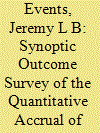

|
|
|
| 6 |
ID:
188078
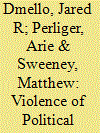

|
|
|
|
|
| Summary/Abstract |
Ideological violence, according to previous research, tends to spike following what may be perceived as an electoral success of an ideologically-affiliated political camp. Despite a growing number of examples across the globe, the extent to which ideological success in electoral processes impacts terrorism within constituencies remains under-researched. This exploratory analysis seeks to examine how majority-minority outcomes in the electoral process influence terrorism in democratic states. This study employs a longitudinal case study approach for the Republic of India, using publicly available data from the Census of India and open-sourced data on terrorist activity. We find that economic stress most strongly impacts the likelihood that supporters of the political majority will engage in terrorist activity, followed by social cohesion, measured through religious homogeneity.
|
|
|
|
|
|
|
|
|
|
|
|
|
|
|
|
|
|
|
|
|